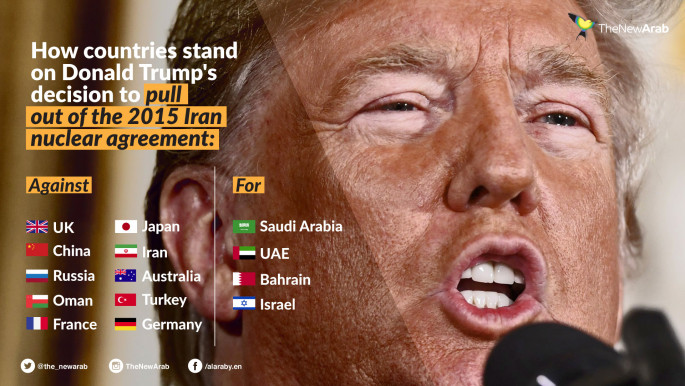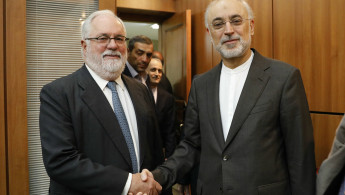Can Europe defend Iran?
It is difficult to predict whether the Iranian nuclear deal will survive and how the unilateral decision of the US to leave the deal will impact the other parties of the deal, notably European states. National security adviser John Bolton recently said that he believes European nations will ultimately join the US and leave the Iran nuclear agreement.
But this statement sounded just too optimistic as EU leaders expressed "regret and concern" over US decision and pledged their "continuing commitment" to terms of the agreement, formally known as the Joint Comprehensive Plan of Action or JCPOA.
However, according to Daniel Wagner, the founder and CEO of Country Risk Solutions and a widely published author on current Middle East affairs, the fate of the deal is in the hands of Iran, which has a choice to make: "either pursue a continuation of the JCPOA and trade and investment relations with Europe, or pursue its nuclear weapons programme. It cannot have it both ways. If Iran chooses to pursue its nuclear programme once again, the Europeans will surely join the US in reimposing sanctions," he said.
Since Donald Trump entered the White House, Europeans have taken different approaches than the American president on many global security issues. Iran and its nuclear deal top the list. Given the Donald Trump's confrontational stance towards Iran nuclear deal, the transatlantic clash seems almost inevitable.
Read also: New US sanctions will make Iranians sicker
Despite the declared commitment, preserving the deal will be anything but an easy task for the Europeans and other remaining parties of the deal.
The US president vowed he would reimpose the highest level of economic sanctions, which were lifted under the 2015 deal, warning that any nation helping Iran "in its quest for nuclear weapons" could also be strongly penalised by the US.
 |
The US president vowed he would reimpose the highest level of economic sanctions, which were lifted under the 2015 deal, warning that any nation helping Iran 'in its quest for nuclear weapons' could also be strongly penalised by the US |  |
Europe under US pressure
This puts Europeans in the very awkward position which may open up an unprecedented rift between Europe and the United States, especially if the Trump's administration decides to sanction EU companies. Richard Grenell, the new US Ambassador to Germany, for example, sent out a warning to German businesses on Twitter, saying that "German companies doing business in Iran should wind down operations immediately."
The stakes are especially high for the three major European powers. A resumption of US sanctions could jeopardise tens of billions of dollars in business deals.
Airbus Group SE, for example, signed off on a contract with Iran for 100 airplanes worth about $19 billion. The same goes for the French energy corporation Total SA, which along with China National Petroleum Corp signed a 20-year agreement valued at $5 billion to develop phase 11 of the South Pars offshore gas field. Finally, the City of London will play a crucial role in either renewing the sanctions or trying to counteract them.
Yet, it remains to be seen whether EU has enough diplomatic skills and economic potentials to keep the deal with Iran alive, and how it will respond to the US reimposed sanctions against Iran.
Read also: Trump doesn't understand the art of the Iran deal
Frederica Moghereini, High Representative of the European Union for Foreign Affairs and Security Policy, said that the European Union cannot provide legal and economic guarantees to Iran after the United States pulled out of the 2015 nuclear accord, but is serious about seeking a way to keep investment flowing.
Thierry Coville, a research fellow at IRIS (French research centre for international and strategic studies), told The New Arab that Europeans have been preparing for a plan B in the case of the US cancelling the deal. Besides, the Europeans are thinking of putting in place some public financing scheme to expand trade with Iran (as European private banks are still fearful of US sanctions), and also of preparing some legal process to counter-attack if the US wants to impose extra-territorial sanctions on European companies.
The partial answer has been delivered after the EU Sofia meeting, when EU leaders discussed the measures to protect the EU's interests and respond to US decision to scrap a nuclear deal with Iran and threatening to impose tariffs on steel and aluminium from June 1.
EU came to an agreement to use and modernise the so-called "blocking regulation" which in this particular case bans European companies from respecting American sanctions where those sanctions might damage EU interests. However, the regulation has not been tested before and it needs to be urgently updated as it has been adopted more than 20 years ago.
It is also unclear how to what extent this measure will be enforced as European companies are more focused on the US than Iran, and it is highly unlikely that they would choose to compromise their market access to the US.
For the Europeans, Wagner notes, the JCPOA has a trade and investment element; for the US, it largely does not. Europe is clearly interested in maintaining a trade and investment relationship with Iran because of the commercial benefits of doing so. According to him, "Europe also has a choice to make – it cannot abide by US sanctions, have a cordial relationship with the US on this subject and have the same trade and investment relationship with Iran. It, too, must choose," he continued.
 |
Europe also has a choice to make – it cannot abide by US sanctions, have a cordial relationship with the US on this subject and have the same trade and investment relationship with Iran. It, too, must choose |  |
 |
|
The new deal is not possible
While the EU will continue to support the Iran deal "as long as Iran respects the deal," the EU will also address US concerns over Iran's role in the Middle East crisis and its ballistic missile programme as well. But this does not necessarily open the door to any new renegotiation of the current deal – something that would please the US administration.
Richard Nephew, a former member of the US negotiating team with Iran and State Department Iranian sanctions expert in the Obama administration, said that Iranian politics will be hard to persuade to approach any new negotiations.
"I think Iran would be prepared to negotiate on some issues but the present situation is too much of a threat and ultimatum for Iran to accept," he told The New Arab.
Read also: It's time to talk about Israel's nuclear weapons
The response from Iran's both civilian and military leaders to a potential "new deal" was one of defiance. President Hassan Rouhani said that "not a single word will be added to or removed from the agreement." However, Coville said that the JCPOA should be considered a "pillar" for opening new discussions with Iran on other issues like Iran ballistic programme, Iran's role in the region, or the Iranian nuclear programme after the JCPOA.
Of course, it will not be easy to negotiate with Iran on these issues as Iranians consider that, in the case of their ballistic programme, it is a question of sovereignty.
On the other hand, Coville thinks that the best way to convince Iranians to negotiate on these issues is to show them that they have an interest in negotiating deals with the West. So, the best strategy for the West should be to respect the JCPOA and to act for the JCPOA to generate all its potential economic benefits to Iran.
Stasa Salacanin is a freelance journalist who has written extensively on Middle Eastern affairs, trade and political relations, Syria and Yemen, terrorism and defence



